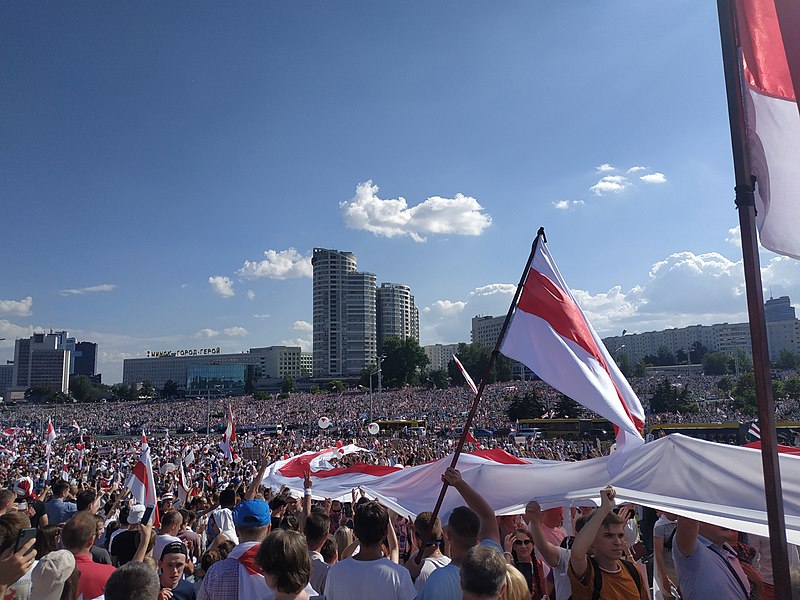
Image by Максим Шикунец
Mass protests against Belarusian President Alexander Lukashenko are dying down, although the political turmoil in the Eastern European country is far from over. Faced with demonstrations and a nationwide strike staged by the West-backed opposition, Belarusian leader had to turn eastward and make concessions to Russia in order to get the Kremlin’s support. What will that mean for the future of Belarus?
Before the presidential election, held on August 9, President Lukashenko was known for his “multi-vector” foreign policy. He was relatively successfully balancing between Russia and the West, and occasionally even trying to play the China card.
“China is a priority for our country. We rely on China’s help and support a lot”, Lukashenko said in January after Russia halted oil supplies to Belarus due to the price dispute between the two allied countries.
For the next six months, Belarus was buying crude oil and natural gas from countries such as Norway, Saudi Arabia and the United States, in order to demonstrate it can diversify its energy imports. Still, the country remained dependent on Russian oil and gas. The problem for Belarusian authorities was the Kremlin was no longer willing to provide energy at discounted prices. Moscow was blackmailing its ally, demanding from Lukashenko agreement to deepen Belarus’ integration into the Russia–Belarus Union State, in order to keep getting cheap oil and gas, as well as subsidies for Belarusian economy. Lukashenko was aware that such concessions would mean the end of Belarusian sovereignty, as Minsk would have to share common monetary and fiscal policy with Moscow. That is why he tried to flirt with the West, and even met with the US Secretary of State Mike Pompeo in February. However, everything changed after the August 9 controversial election.
The United States, European Union and the Great Britain did not recognize Lukashenko’s victory. Instead, they openly supported the opposition that staged mass protests all over the country. During the very first days of the anti-Lukashenko demonstrations, even certain political structures in Russia sided with the opposition and condemned the Belarusian leader for allegedly rigging the election. It was a clear message to Lukashenko that he will have to agree to Russia’s terms and conditions regarding the energy trade. Also, as Russian President Vladimir Putin pointed out in his letter of greetings to Lukashenko’s re-election, the Belarusian leader is expected to “facilitate the further development of mutually beneficial Russian-Belarusian relations in all spheres, as well as the further enhancement of cooperation within the Union State, the strengthening of integration processes within the Eurasian Economic Union and the CIS and of military-political ties within the Collective Security Treaty Organization.”
After the protests escalated, Lukashenko reportedly pleaded for Putin’s help. The Russian President said he formed a police reserve force to intervene in Belarus if necessary. Since Lukashenko managed to consolidate his power, it is very unlikely that Russian police and military will have to be deployed to the former Soviet republic. However, Russia sent its PR experts to assist Lukashenko in propaganda warfare, and Russian media reduced their criticism towards Belarusian strongman. In other words, Lukashenko likely made some deals with Putin, which means that he can now count on Russia’s support in his struggle to stay in power. On the other hand, he will unlikely be able to flirt with the West and China now, as his position heavily depends on the Kremlin.
In the near future, Lukashenko is expected to intensify negotiations with Putin on the future of the Russia-Belarus Union State, and potentially Eurasian Union as well. He may even sign some documents regarding the future of those entities, but it remains to be seen how the West react and if that will lead to further escalation of the protests. It is also worth noting that Russian Foreign Minister Sergey Lavrov recently welcomed Lukashenko’s proposal of constitutional reform which could pave the way for Belarus’s closer integration into Russia-led organizations. Besides that, a new constitution could limit Lukashenko’s power and even change the country’s political system from presidential to semi-presidential, or even a parliamentary one.
In any case, Lukashenko’s days in power are numbered. In theory, he could keep running the country for the next five years, although Moscow will likely force him to step down earlier. The protests did not manage to overthrow the Belarusian leader, but have significantly weakened him and turned him into another Kremlin client. Russia now has another trump card it can use in its trade with its “dear Western partners”. For Belarus, the days of sovereignty are a thing of the past, as the country has become a pawn in a geopolitical game between Russia and the West.
- Russia Forms ‘Law Enforcement Unit’ To Aid Lukashenko In Belarus If Needed
- Russian Propaganda Pushing ‘Breakup’ Of United States

